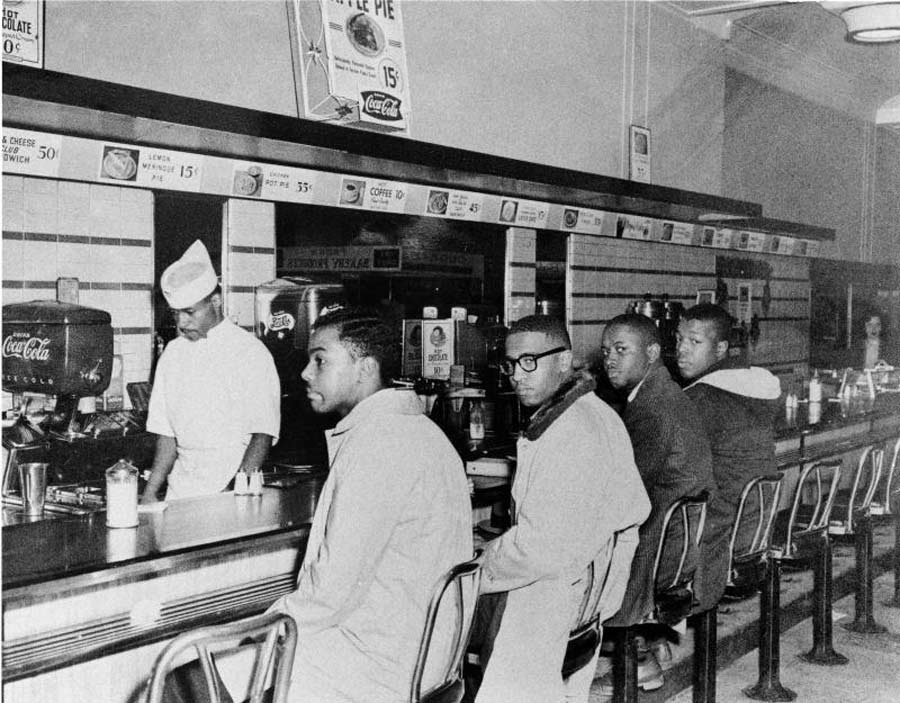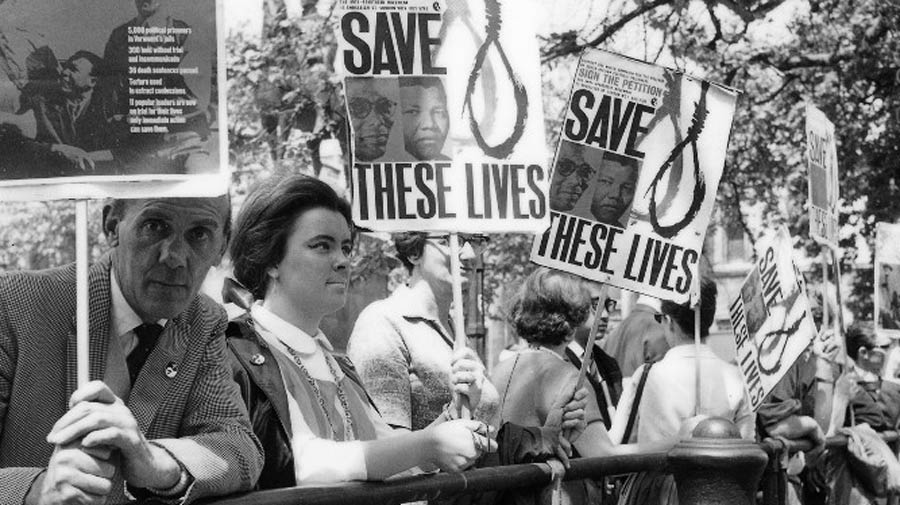The views expressed in our content reflect individual perspectives and do not represent the authoritative views of the Baha'i Faith.
In 1966, the United Nations established March 21 as the “International Day for the Elimination of Racial Discrimination,” The day commemorates the 1960 Sharpeville Massacre in South Africa, a tragic incident where 69 black South Africans — men, women, and children — were shot and killed by South African police while demonstrating against the South African government’s racial discriminatory pass laws and apartheid. Southern states in the United States had long had their own apartheid, commonly known as Jim Crow. These laws stemmed from the end of chattel slavery in 1865 and enforced segregation and racial discrimination in transportation, finance, education, food service, accommodation, and amenities — including access to public water fountains, parks, and beaches.
“the earth is but one country, and mankind its citizens”
To me, remembering March 21 as the day dedicated by the United Nations to end racial discrimination is as powerful today in 2020 as it was in 1966. Each of us, on this planet, here and now, must act consistently to end the human behavior of racial discrimination — and eliminate any aversion we feel to people who do not act, think, or look like we do.
By creating a day to eliminate global racial discrimination, the United Nations called on all member nations, including the United States, to redouble their respective national efforts to eliminate racial discrimination. This day was a historic event which echoed the proclamation, more than 100 years earlier of Baha’u’llah, the Prophet-Founder of the Baha’i Faith that: “the earth is but one country, and mankind its citizens.” His proclamation, which happened around April 21, 1863, established eliminating racial discrimination as a principle of the oneness of humanity.
Indeed, when considering the principle of eliminating racial discrimination, March 21 (and April 21) are significant dates for the global Baha’i community. March 21 is the approximate date of “Naw-Ruz” or “new year” in Persian, which begins, according to the annual lunar calendar, on the first day of spring. Naw-Ruz commemorates new birth, renewal, growth, and change after a period of dormancy.
In 1960, movements to end apartheid in both South African and the United States were in full swing. White and black activists worked side by side to dismantle centuries of racial discrimination towards people of African descent. For Baha’is, 1960 was also a pivotal and historic year. The community was engaged in a process of evolution set in motion in 1863 — an electoral process designed to implement the elimination of racial discrimination, to promote race unity, and to establish the foundation of world peace and security.
1960 was the midpoint between two unique forms of the worldwide Baha’i community’s administrative guidance, embedded in both the writings of Baha’u’llah and of His eldest son Abdu’l Baha. Following this divine guidance was a promise of unity, a covenant to generate and secure the spiritual and human resources necessary to establish peace on earth — which included eliminating racial discrimination by humanity at the grassroots. Eliminating racial discrimination is a central component of Baha’i administration: the system of organizing the administrative and spiritual affairs of the growing numbers of men, women, and children throughout the world who, in 1960, were attracted to the principles of the Baha’i Faith.
On or about April 21 Baha’is commemorate Baha’u’llah’s declaration in 1863 by electing their local and national “spiritual assemblies.” These assemblies are elected in every locality of the world where there are nine adult Baha’is and members administer the affairs of their Baha’i communities within their respective areas. Assemblies are elected by Baha’is over the age of 21 through secret ballot, and without campaigning or electioneering. Because the Baha’i Faith forbids proselytizing and has no clergy, these assemblies serve collectively as a group of nine, not individually, in their local or national areas, to actively promote Baha’i principles — including eliminating racial discrimination.
Following the untimely death in 1957 of Shoghi Effendi, the grandson of Abdu’l-Baha and the head of the global Baha’i community at the time, these local and national Baha’i assemblies faced severe tests and glorious victories — and this was true in the United States. As civil rights activists were being beaten and hosed for desegregating lunch counters, these assemblies in the U.S. were composed of black and white women and men serving together.

Each assembly endeavored to demonstrate in word and deed the Baha’i principle of the recognition of the essential oneness of every human being as a creation of one Unknowable Creator. Using Baha’u’llah’s principle of consultation, Baha’is all over the world guided their activities towards unity in their affairs:
In all things it is necessary to consult….so that consultation may be observed by all…consultation may be fully carried out among the friends, inasmuch as it is and will always be a cause of awareness and of awakening and a source of good and well-being. – Baha’u’llah, Tablets of Baha’u’llah
These assembly members were not without assistance and guidance. From 1957 until 1963, 27 diverse Baha’is, women and men from different countries — individuals who had been appointed by Shoghi Effendi during his lifetime — counseled and supported Baha’i assemblies’ in their active commitment to eliminating racial discrimination. Geographically dispersed, and often experiencing significant personal challenges and obstacles, these 27 people continuously traveled around the world during this period, visiting diverse Baha’i communities, and sharing the principles of the oneness of humanity. Their mission in 1960 was to support the efforts of Baha’is in every part of the world — including in South Africa and the United States — to demonstrate the principle of eliminating racial prejudice through actions. As Baha’u’llah wrote:
It behoveth the people of Baha to render the Lord victorious through the power of their utterance and to admonish the people by their goodly deeds and character, inasmuch as deeds exert greater influence than words. – Baha’u’llah, Tablets of Baha’u’llah
Through the united efforts of these assemblies and these 27 souls, thousands of people from all walks of life and from diverse racial and ethnic groups were attracted to the principles of the Baha’i Faith, and wanted to read and study about Baha’u’llah. Throughout the political and social upheavals of the 1960s, these people became Baha’is, thereby promoting Baha’u’llah’s principle of the oneness of humanity. This was of particular importance in South Africa and the United States, because, under the explicit guidelines of Shoghi Effendi, Baha’is are not allowed to hold segregated meetings.
During this period, the elimination of racial discrimination and a commitment to the oneness of the human family was the warp and woof of the global Baha’i community. The global unity of the Baha’i Faith from 1957 to 1963 also resulted in the 1963 election of the Universal House of Justice, the supreme governing body of the Baha’i Faith. This body continued to guide, support, and advise the growth of the worldwide Baha’i community in establishing the fundamental truth of ending racial discrimination.
In 1964, the U.S. enacted the Civil Rights Act, which formally ended Jim Crow. Thirty-two years later in 1996, Nelson Mandela, the first South African president of African descent signed a new constitution that formally ended apartheid. Unfortunately, despite these and other Herculean efforts by individuals, governments, organizations, and nations in the world, rampant racial discrimination persists in both countries and beyond.

In 1985, the Universal House of Justice issued “The Promise of World Peace” a restatement to the world, of the fundamental principles of the Baha’i Faith. It asserted how critical ending racial discrimination is:
Racism, one of the most baneful and persistent evils, is a major barrier to peace. Its practice perpetuates too outrageous a violation of the dignity of human beings to be countenanced under any pretext. Racism retards the unfoldment of the boundless potentialities of its victims, corrupts its perpetrators, and blights human progress. – Universal House of Justice, Promise of World Peace
Today, the ongoing challenge for me, as an individual committed to eliminating racial discrimination, is to overcome my own human limitations, my profound grief at the seeming intransigence of racial discrimination in my midst. I must also resolutely commit my actions to face and overcome the fear of failure — a fear that feeds my suspicions and keeps me from seeing every human being I meet as a member of my human family.
The world community of the Baha’i Faith, established in 1863, unleashed the spiritual forces of personal and collective transformation. We are assured of the eventuality of world peace through resolute action to eliminate racial discrimination. On this day and every day, let us renew our efforts to eliminate racial discrimination from our hearts and uphold the essential nobility of every human being.

















Comments
Sign in or create an account
Continue with Facebookor